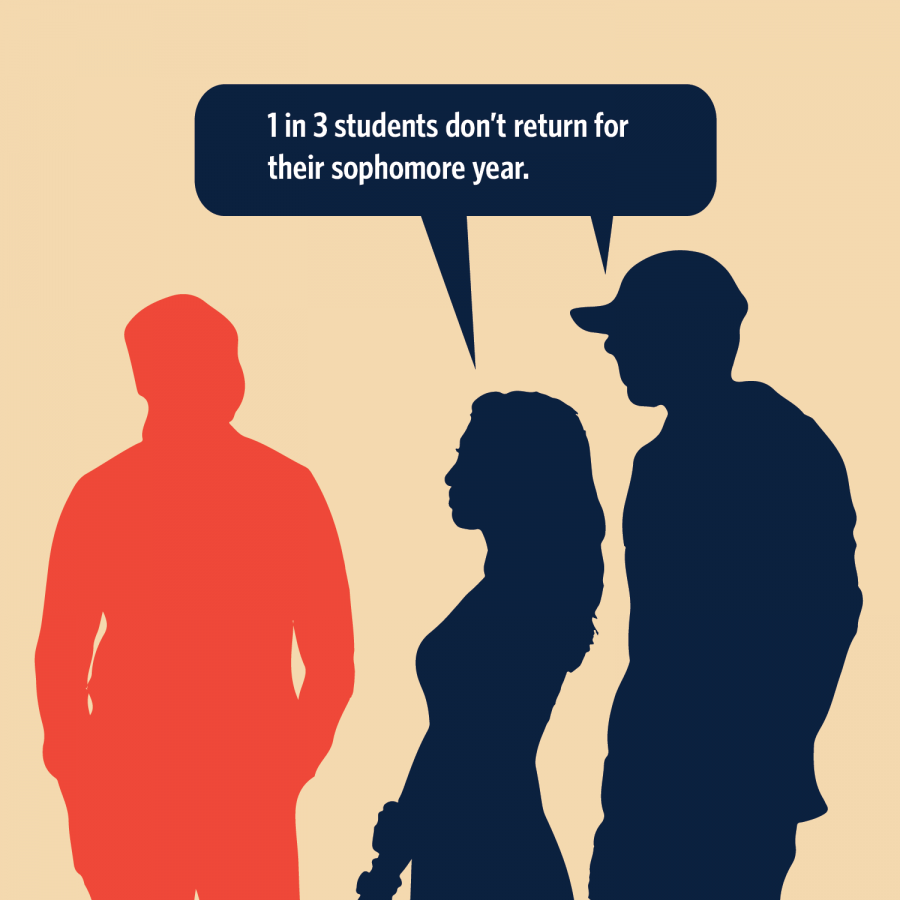Students fall off mainstream paths to success
Jan 14, 2019
In the college atmosphere, it’s easy to notice high graduation rates, successful alumni and the overall prestige of a university. However, a topic that is alarming — yet usually unnoticed — is the dropout rates for freshmen across the country.
Gary J. Wszalek is the head academic adviser for the psychology department in LAS.
“Sometimes a student is coming in the University (wanting) to try the hardest major because that makes (them) the smartest,” Wzsalek said. “Sometimes students don’t want to admit that they like psychology because they think they should be going into … biology.”
After their first semester, many students realize changes must be made for them to succeed, he said. These changes can often come in the form of transferring within their college of enrollment, transferring out of the University altogether, switching majors or a combination of these paths.
“The cornfields in central Illinois do not fit every student,” Wzsalek said. “Yes, we’re the prestigious University of Illinois … (but) sometimes students feel isolated … This place is huge and you can easily get lost.”
Get The Daily Illini in your inbox!
In addition to academic-related issues, students may feel their emotional needs aren’t being met to the extent they feel out of place, he said.
“I am more concerned about if (students) don’t feel welcomed, or if (they) don’t see faces that are like (theirs) … Then that’s a bigger issue for the University to address, and they do their best,” Wzsalek said. “If we get a crappy reputation about not being an inclusive, diversified campus then it defeats the purpose … Fewer students are gonna be coming.”
As an adviser, Wzsalek helps students identify their interests, strengths and struggles.
“Our office tries to (create) a fall semester of classes that allows them to do as much exploration as possible,” Wzsalek said. “The goal is, we want you to get a degree. I don’t get a commission whether students stay in psychology or not. I want you to be in the place that best suits you.”
Stephen Herzog is the academic coordinator for undergraduate programs in the Department of Computer Science. While students in the University are reputed to be high-performing scholars, he said, some students choose majors for the prestige and not because of individual interest.
“It’s probably no big secret that there are a lot of opportunities for jobs in (computer science), and some of those jobs could be pretty well paid,” Herzog said. “A student may not be intuitively interested in (computer science), but they may think ‘this is my straight line to a good job, so I’m gonna do this.’”
This desire to pursue majors that don’t align with one’s interest are oftentimes rooted in outside pressure from family and friends who associate success with a particular major.
“They may have parental pressure. Parents are paying a lot of money for them to come to college … Going to a really good (computer science) department seems like a sure bet,” Herzog said.
With a diversified population, the University enrolls students with a variety of experiences and insights that either help or harm their first few semesters.
“I do see some students struggle, and I think it’s less a matter of them not understanding material, because they are not ready for college,” Herzog said. “They have not established really good study skills. They haven’t really managed their own time, and they get turned loose and they’re not ready.”
Cory Ohms is an assistant dean of the College of ACES and deals with student success, the probation and drop status of students and their re-entry into the College of ACES.
While the University understands not every student may be a good fit, he said, many members of faculty and staff try to do their best to address the needs of the student before extensive decisions have to be made.
“In ACES, if any student says that they’re struggling or are on probation, we have them work with our academic success program,” Ohms said. “They would do a self assessment, they would have to meet with their adviser … If (they) don’t understand the material, then we try to get tutoring.”
Because the University is so rigorous, as well as being larger in size and population, it’s important for students to understand they are not alone in their decisions and they shouldn’t be ashamed of changes they have to make, Ohms said.
“I would want them to know that they are certainly not alone … This is a pretty common occurrence, whether that its fortunate or unfortunate,” Ohms said. “Every single student will encounter an obstacle, and it’s how you navigate obstacles that determines how successful you’re gonna be.”






